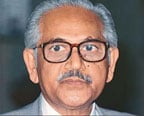 Justice JS Verma’s opinion in the SEBI matter raises important issues that require public debate. He says it is important for the government and the judiciary to ensure that the independence of quasi-judicial bodies is fully protected and that executive power is not misused to interfere with their decision-making, their independence and their integrity. Such quasi-judicial orders, he says, should not be subject to review or interference by executive authorities, who have neither the power nor the requisite expertise to review, alter or nullify them; they can only be reviewed “by lawfully authorised tribunals or courts, based on well- established principles of law.”
Justice JS Verma’s opinion in the SEBI matter raises important issues that require public debate. He says it is important for the government and the judiciary to ensure that the independence of quasi-judicial bodies is fully protected and that executive power is not misused to interfere with their decision-making, their independence and their integrity. Such quasi-judicial orders, he says, should not be subject to review or interference by executive authorities, who have neither the power nor the requisite expertise to review, alter or nullify them; they can only be reviewed “by lawfully authorised tribunals or courts, based on well- established principles of law.”
Interestingly, SEBI is the first independent regulator and has served as a model for other regulators in power, telecom, petroleum or highways. Every regulator needs a periodic clean-up, especially when things go wrong. Under the Bush administration, the process of selecting the chief of the Securities Exchange Commission (SEC) had turned controversial with allegations that some incumbents were far too close to Wall Street. The Bernie Madoff scandal again exposed how the watchdog had ignored all signals about his massive Ponzi operation. The new chairperson, with a tough reputation, is now on a clean-up mission.
Many aspects of SEBI’s functioning also need review and course-correction to ensure that we have not created a monster whose actions cannot be questioned; or whose actions flout established principles of law. Without alleging any wrongdoing, let me flag some areas of potential conflict, bad decisions or systemic flaws. Consider the legal opinion obtained by SEBI from C Achuthan, former presiding officer of the Securities Appellate Tribunal (SAT) to nullify the Gopal-Leeladhar orders. Mr Achuthan is a director of the National Stock Exchange which set up NSDL. Coincidentally, around the same time as his opinion was sought, Mr Achuthan was asked to head the committee to review the takeover code.
Similarly, the extraordinary powers of whole-time members (WTMs) need review. Moneylife has repeatedly pointed to the questionable orders issued by TC Nair, a former WTM, who blithely let off select companies or intermediaries involved in extraordinary violation of rules (the Zee Group’s exoneration in the Ketan Parekh scam is one example). Admitting that the orders were dubious, a SEBI insider says that it cannot challenge or nullify the actions of its own director. Consequently, other companies, which were in cahoots with Ketan Parekh, may cite the precedent and also be let off. There are many such instances. Another outrageous aspect of SEBI’s functioning is the manner in which consent issues are decided. Although the process includes discussion by a committee that includes outside members, it is no secret that SEBI officials drive the negotiations and decide the payment (without admitting or denying guilt). Unlike elsewhere in the world, the process is not subject to judicial ratification. This has led to several absurd decisions where the guilty are let off with a rap on the wrist and those who don't play ball suffer crippling penalties. Clearly, now that SEBI, in its statutory avatar, is set to turn 18, it is time for a serious review to ensure more maturity in its future behaviour.